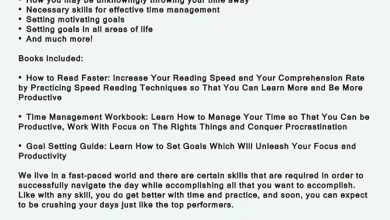
As a business owner, you are likely always looking for ways to be more efficient and get the most out of your day. Time management is key to running a successful business, and a few simple tips can help you make the most of your time.
First, create a daily schedule and stick to it as much as possible. This will help you stay on track and not waste time on tasks that can wait. Make sure to include breaks in your schedule so you can stay refreshed and focused throughout the day.
Next, delegate tasks whenever possible. You don’t have to do everything yourself – delegate tasks to employees or other team members so you can focus on the most important aspects of running your business.
Finally, use technology to automate repetitive tasks or manage your calendar and emails.
By following these simple tips, you can make the most of your time as a business owner and run a more successful operation.
What are the 7 Time Management Tips?
Assuming you would like tips for managing your time:
- Make a list of what you need to do
- Set deadlines for yourself
- Work on one task at a time
- Take breaks in between tasks
- Delegate or outsource certain tasks
- Don’t procrastinate
What are the 4 P’S of Time Management?
The 4 P’s of Time Management are Planning, Prioritizing, Procrastinating and Persistence.
Planning: The first step to good time management is creating a plan. This means taking the time to figure out what tasks need to be completed and when they need to be done. This can be done by creating a daily or weekly to-do list. For larger projects, it may be helpful to create a more detailed project plan that outlines each task that needs to be completed and when it needs to be done.
Prioritizing: Once you have a list of the tasks that need to be completed, the next step is to prioritize them. Not all tasks are created equal and some will need to be completed before others.
One way to prioritize tasks is by using the ABC method which classifies tasks as A (urgent and important), B (important but not urgent) or C (neither urgent nor important). Another way to prioritize tasks is by using the Eisenhower Matrix which classifies tasks as Urgent/Important, Important/Not Urgent, Not Important/Urgent or Not Important/Not Urgent.
Procrastinating: One of the biggest enemies of good time management is procrastination. This is when we put off doing a task because we don’t want to do it or because we think it can wait until later. Unfortunately, this often leads to us feeling overwhelmed because we have a lot of unfinished tasks on our plate.
To avoid procrastination, it’s important to identify why you are procrastinating and then find ways to overcome it. For example, if you’re procrastinating because you don’t want to do a task, try breaking it down into smaller steps so it feels less daunting. Or if you’re procrastinating because you think a task can wait until later, ask yourself if it really does need to be done now or if it can wait until tomorrow or even next week.
Persistence: Last but not least, one of the most important aspects of good time management is persistence. This means sticking with your plan even when things get tough or when you feel like giving up.
What are the 5 Elements of Time Management?
There are endless ways to manage your time, but most effective techniques have five things in common:
1. Set Goals: The first step to good time management is setting goals. You need to know what you want to achieve before you can start planning how to achieve it. Once you have a goal in mind, break it down into smaller tasks that you can complete and measure progress along the way. This will help keep you motivated and on track.
2. Make a Plan: Once you know what your goals are, it’s time to make a plan of action. Decide when and how often you will work towards your goal, and stick to that schedule as much as possible. If possible, set deadlines for each task so that you can keep yourself accountable. And don’t forget to account for breaks! Taking regular breaks will help improve your focus and concentration.
3. Eliminate Distractions: Distractions are the enemy of good time management! When you’re trying to focus on a task, eliminate anything that might pull your attention away from it. That means turning off your phone, closing social media tabs, and finding a quiet place to work if needed. If distractions are unavoidable, try using a timer so that you can give yourself permission to take break after a certain amount of time has passed
4.. Take Advantage of Technology: There are lots of great tools out there designed specifically to help with time management . Experiment with different ones until you find something that works for you , then use it religiously ! Some popular options include apps like RescueTime or Toggl , which track how long you spend on various activities , desktop extensions like StayFocusd 5., which limit the amount of time spent on distracting websites , or project management tools like Asana or Trello . which help organize complex tasks .
5 Get Help From Others: Finally , remember that good time management isn ’ t just about working hard – it ’ s also about knowing when to ask for help . If there ’ s someone who is better at or more experienced with a certain task than you are , don ’ t be afraid delegate it them ! This will free up some of your own time so that you can focus on other things .

Time Management Tips For Business Owners
In business, time management is the process of planning and controlling how much time you spend on each task. It’s a crucial skill for any entrepreneur or small business owner, because it can help you be more productive and get more done in less time. There are a few different ways to approach time management in business.
One popular method is the Eisenhower Matrix, which helps you prioritize tasks by urgency and importance. Another common approach is to use the Pomodoro Technique, which involves working on one task for 25 minutes and then taking a 5-minute break. No matter what method you use, there are a few key tips that will help you manage your time more effectively:
1. Set priorities and goals. Before you start your workday, take a few minutes to think about what needs to be accomplished. Make a list of tasks in order of importance and set realistic goals for each one. This will help you stay focused and avoid getting sidetracked by less important tasks.
2. Create a schedule…and stick to it! Once you know what needs to be done, make a schedule for yourself and try to stick to it as much as possible. If you know you work best in the morning, try to do your most important tasks then. And if possible, build in some buffer time in case things don’t go exactly as planned.
3. Take breaks…but not too many! It’s important to take breaks throughout the day so that you don’t get burnt out or overwhelmed.
Time Management Strategies
There are a lot of different time management strategies out there, and it can be tough to know which one is right for you. That’s why we’ve put together this list of some of the most popular time management strategies, so you can find the one that works best for you. The Pomodoro Technique: This technique is all about working in short bursts.
You work for 25 minutes and then take a 5 minute break. After 4 “pomodoros” (25 minute work periods), you take a longer break, usually 20-30 minutes. This technique helps to keep you focused and prevents burnout.
The Eisenhower Matrix: This strategy is all about prioritizing your tasks. You start by writing down everything you need to do and then categorize them as urgent/important, not urgent/important, or urgent/not important. This helps you to focus on the tasks that are actually going to move the needle forward, and avoid getting bogged down in unimportant details.
The Swiss Cheese Method: This method is all about preventing distractions. You start by identifying all of the potential distractions in your environment (like your phone or email) and then find ways to eliminate them (like putting your phone on silent or turning off notifications). Once you’ve eliminated as many distractions as possible, you can focus on getting your work done without interruption.
Importance of Time Management for Business Owners
Time management is more important than ever for business owners in today’s fast-paced business world. With so many demands on their time, business owners must learn to manage their time effectively to succeed. There are several benefits to effective time management for business owners.
Perhaps the most important is that it can help you get more done in less time. This can lead to increased productivity and efficiency, which can translate into increased profits. Time management can also help you reduce stress levels and improve your work/life balance.
When you’re able to get more done in less time, you’ll have more free time to enjoy your personal life outside of work. This can lead to a healthier and happier lifestyle overall. Finally, good time management skills can make you more attractive to potential clients and customers.
When they see that you’re able to efficiently handle your workload, they’ll be more likely to do business with you. If you’re not currently using effective time management strategies, now is the perfect time to start! Implementing even a few simple techniques can make a big difference in how well you’re able to run your business.

Time Management in Business Communication
In the business world, time management is essential to effective communication. With so many demands on our time, prioritizing and staying organized can be difficult. However, by taking some simple steps to manage your time more efficiently, you can ensure that your communication is clear, concise, and timely.
Here are some tips for better time management in business communication:
1. Set priorities and stick to them. When you have a lot of tasks on your plate, it can be tempting to try to do everything at once. However, this usually leads to rushed, sloppy work and ineffective communication. Instead, take a few minutes at the beginning of each day or week to sit down and identify your top priorities. Then, focus your attention on these tasks and see them through to completion before moving on to anything else.
2. Streamline your process. If you find that you’re spending too much time on repetitive or unnecessary tasks related to business communication, take a step back and streamline your process. For example, if you’re sending out the same email over and over again with only minor changes each time, create a template that you can easily customize for each recipient. This will save you valuable time in the long run.
3. Use technology wisely. Technology can be both a blessing and a curse when it comes to business communication – it’s great for staying connected but can also be a huge time-waster if used improperly.
To make the most of technology without sacrificing efficiency, learn how to use all of the features of your email program (such as filters and folders) and utilize online scheduling tools like Google Calendar or Appointlet. These tools can help keep you organized, and on track, so you don’t waste valuable time searching for information or remembering important details.
Research About Time Management in Business
Few things are as important to the success of a business as time management. Yet, research shows that most people are pretty bad at it. In fact, a study by the University of California found that the average person only has about a 50% chance of completing any given task on time.
There are all sorts of reasons why time management is so important in business. For one, it’s essential for meeting deadlines and keeping projects on track. Poor time management can lead to costly delays and missed opportunities.
It can also negatively impact employee morale and productivity. Fortunately, there are some simple steps you can take to improve your time management skills. One is to keep a daily schedule and stick to it as much as possible.
This will help you stay organized and focused on what needs to be done each day. Additionally, try to break down big projects into smaller tasks that can be completed more easily. And don’t forget to delegate!
Assigning tasks to others can free up your own time so you can focus on more important matters. By following these tips, you can start making better use of your time and improving your business in the process!
Conclusion
As a business owner, you are likely always looking for ways to improve efficiency and get the most out of your employees. One way to do this is by implementing some time management tips.
1. Set clear expectations – let your employees know what you expect from them in terms of work hours and deadlines. This will help them to be more focused and efficient with their time.
2. Create a schedule – Having a daily or weekly schedule can help everyone in the office stay on track. You can use online tools like Google Calendar to share the schedule with everyone in the company.
3. Take breaks – Encourage your team to take breaks throughout the day, even if it’s just for 5-10 minutes. This will help them avoid burnout and stay fresh throughout the workday.
Thanks for ready this post. If you have any questions, you can comment below.



